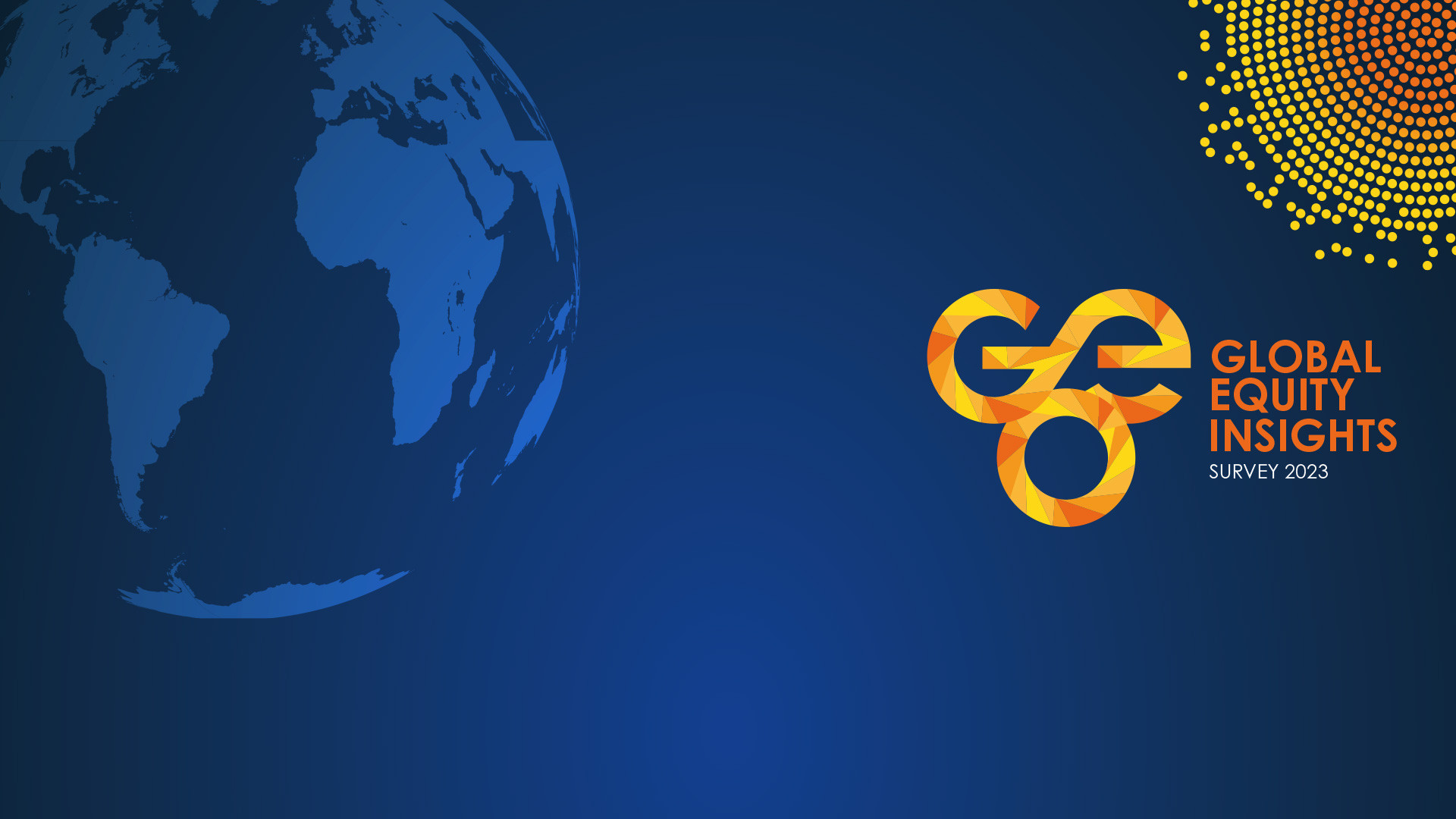- Institutional investors exert greater influence on equity programs
- Companies want to retain top talent, but leave retention tools unused
- Global Equity Insights Survey 2023: Results of the world's most comprehensive study on equity-based compensation and employee participation
Frankfurt, June 09, 2023. With the Global Equity Insights Survey (GEIS) 2023, the hkp/// group publishes the world's leading study on current market practice in share-based compensation and employee participation for the eleventh time. In the current edition, the survey finds significant changes in corporate equity programs across global economic regions. Also, despite the volatility of global markets, the popularity of variable equity-based compensation is increasing worldwide, both among employees and at the management level. At the same time, institutional investors and proxy advisors are demanding ever greater consideration of sustainability aspects in the respective compensation systems, as well as their inclusion in capital market communications.
In addition to the design of variable equity-based compensation (long-term incentives, LTI) and employee share purchase plans (SPP), this study also looks at the impact of labor shortages, market volatility and inflation on these HR instruments. It also takes a look at the integration of sustainability or ESG (environment, social and governance) objectives.
The Global Equity Insights Survey is conducted by hkp/// group in cooperation with the Global Equity Organization (GEO) under the scientific leadership of the Chair of Management and Control at the Georg-August-University Göttingen. The survey is supported by Computershare, Fidelity, SAP, Siemens Energy, and Vialto Partners as premium sponsors.
"In part due to emerging responses to crises and unstable markets, insights into market practices, trends and regional differences in equity-based compensation remain more exciting than ever in the eleventh year of the study. In 2023, 184 companies from 22 countries and eleven industries participated - from large to small, from brand new to well-established. This provides valuable insights far beyond the design of equity-based compensation, not least on companies' priorities and management agendas," explains David Voggeser, Partner in Strategic HR Advisory at hkp// group.
The Results in Detail
High Company Performance Correlates with LTI Budgets
In the current version, the GEIS observes a sustained perpetuation of the link between the use of equity-based compensation for large parts of the workforce and the overall performance of companies. Companies with larger LTI budgets tend to be more successful than those with smaller ones. A positive correlation was also found between eligibility, participation and company performance.
Adjustments to their LTI programs were planned by 43% of the companies surveyed. A quarter of these said they would do so on key performance indicators (KPIs). Changes to performance-based targets were primarily the addition of those. Globally, North American companies lead in offering LTIs to a broad section of the workforce.
Employee Share Programs on the Rise
More than half of the participating companies have an employee share program, also known as a Share Purchase Plan/SPP, and the trend is rising. It also became clear that companies that have implemented such programs tend to be at least four percentage points higher in their use of performance-based metrics such as total shareholder return (TSR), return on assets (ROA) and return on invested capital (ROIC).
During the course of the study, most companies (61%) were unable to identify the percentage of equity held by employees under SPPs. The greatest difficulties in calculating the SPP share of equity capital were observed in North America, where more than two-thirds of the companies were unable to identify it, while in Europe this was the case for only half of the companies.
ESG Aspects More Important Than Ever for Compensation
The influence of ESG indicators on the achievement of LTI targets continues to grow globally. Among European companies, the survey showed a comparable trend in reporting on this. For example, European companies communicate LTI-related KPIs in their annual reports far more frequently than North American ones: 54% of companies in Europe compared to only 16% in North America.
The three most important ESG objectives in the context of LTI programs were CO2 reduction, diversity and corporate governance.
Increasing Influence of Investors and Proxy Advisors
80% of the study participants from Europe and North America stated that institutional investors and proxy advisors have a great to medium influence on the design of equity programs. Interestingly, 29% of study participants in the rest of the world even observed a very strong influence on this point.
To meet investor expectations, companies tend to make adjustments to LTI programs rather than SPPs. Around 40% of global study participants were willing to adjust their LTIs, while only 1% of companies in Europe and 10% in the rest of the world would modify SPPs.
"Ultimately, HR managers need to understand how their company's compensation systems reflect its strategy, contribute to the achievement of its business objectives, and what the implications are. More than ever, however, they must also be able to represent these aspects to the capital market in a way that is appropriate for the target group," says hkp/// group Director and global GEIS study coordinator Andrew Thain, explaining the importance of familiar but also new tasks of HR - above all CHROs - in capital market communications.
Higher Salaries to Retain Talent
The survey also shows that almost half of the companies generally do not have any established tools for retaining talent - for example, IT and digital experts. The other half named higher salaries as the most important tool in employee retention, over other instruments such as the more generous granting of shares or an equity-based bonus when signing a contract.
Equity instruments are hardly used to retain internal IT and digital talent. The 20% of companies that provide equity-based compensation here, mostly offer higher share grants.
Only a Few Budgets Increased for Inflation Reasons
Less than half of the study participants increased their compensation budgets as a result of inflation. Of those that did, almost all implemented an increase in LTIs. In addition, companies saw little need to offset the impact of increased energy prices through equity programs - when they did, other instruments were used.
Compliance Management by External Consultants
The vast majority of companies (83%) take into account different tax frameworks in the equity participation of employees working abroad. In addition, almost three-quarters of companies informed their employees about the tax implications of their outstanding equity investments prior to their relocation. This was more common in European companies than in North American ones (80% vs. 63%).
At 67%, the majority of companies reported using external consultants for global tax compliance and obligations under equity programs. Only a few relied on internal sources such as payroll teams or in-house counsel for such matters.
Private Companies in North America Place Greater Focus on IPOs
Very few study participants were planning an initial public offering (IPO) or an exit scenario through a sale, although regional differences were also evident here: European companies actually did not report planning an IPO in any case, while half of the North American companies were considering this. In this context, in addition to internal KPI-based performance cash plans (40%), participation in the value of the company (33%) was also rated most attractive. Event- or exit-based LTI instruments were also named, as frequently as profit-sharing schemes (27%).
Background Information & Reference of the Global Equity Insights Survey
The "Global Equity Insights Survey 2023" was conducted in winter 2022/spring 2023 in cooperation with the Global Equity Organization (GEO) under the scientific leadership of the Chair of Management and Control at Georg-August-Universität Göttingen. The survey is supported by a number of premium sponsors, including Computershare, Fidelity, SAP, Siemens Energy and Vialto. A total of 184 companies from 22 countries and 11 industries participated in the survey during the current study year. The study participants are predominantly global players with a particular focus on North America and Europe.
A summary of the key highlights and findings of the Global Equity Insights Survey is available at: www.hkp.com/GEIS2023.
Background Information on the hkp/// group
hkp// group is an international management consultancy in the field of strategic HR management and corporate governance. Our partners are long-term oriented owners and shape the consulting topics for our clients as much as our own organization. As passionate consultants, we are valued for our innovation and topic leadership. Together with our employees, we are committed to the guiding principle: sustainable performance through people. We support our clients as a trusted advisor for transformational issues around people strategy and good & responsible governance. We combine strategic foresight with in-depth expertise and also support our clients during implementation.



 Download PDF
Download PDF 


